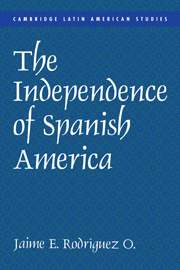5 - Independence
Published online by Cambridge University Press: 05 October 2013
Summary
The return of Fernando VII, the desired, provided an opportunity to restore the unity of the Spanish world. Virtually every act that had occurred since 1808 – the struggle against the French and the political revolution carried out by the Cortes, as well as most of the autonomy movements in America – had been conducted in his name. Many individuals in Spain and America believed that an accommodation based on the legitimacy of the Crown and a more modern representative political system was not only possible but also imperative. Even in the New World, where a few insurgent groups continued to struggle against royalist forces, most Americans favored reconciliation. Manuel de Sarratea, representing Buenos Aires, a region that had maintained its autonomy since 1810 by virtue of its isolation, for example, wrote the king on May 25, 1814, that his government desired reconciliation with the monarch. Bernardino Rivadavia would repeat the offer the following year.
Everyone, even the persas who denounced the actions of the Cortes and the autonomists in America, moreover, believed that change was required. Too much had transpired in the previous six years to return to the status quo ante. When the serviles urged Fernando VII to restore absolutism, they did not seek a return to arbitrary and autocratic rule. On the contrary, they decried the ministerial despotism of the pre-1808 years. The system they favored was the traditional one, characterized by a flexibility and an adaptability that had served the Monarchy well for three centuries.
- Type
- Chapter
- Information
- The Independence of Spanish America , pp. 169 - 237Publisher: Cambridge University PressPrint publication year: 1998

